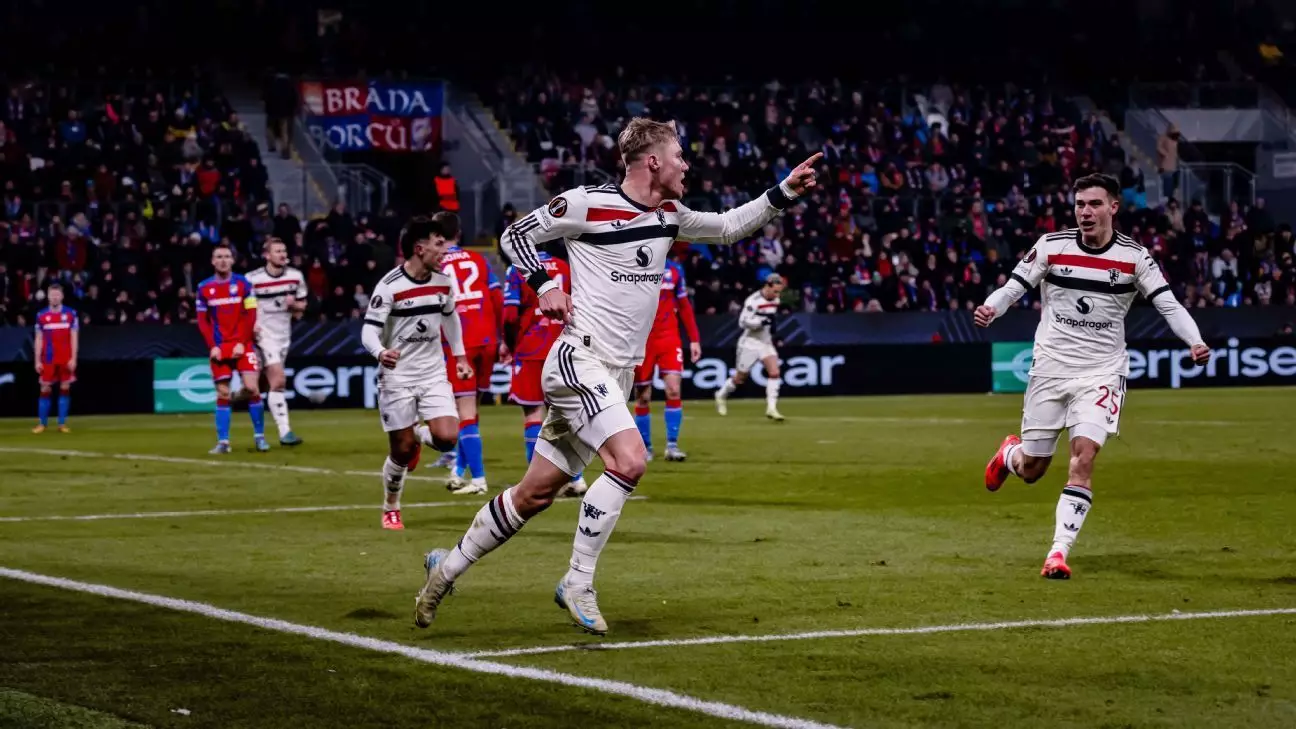In the realm of football, few experiences can be as nerve-wracking as watching a struggling team navigate through a turbulent match filled with misplaced passes and tactical errors. Such was the case for Manchester United during their recent UEFA Europa League encounter against Viktoria Plzeň. The team’s trajectory in this competition, marked by inconsistency and individual blunders, cast a long shadow over their efforts. Yet, amidst the chaos, one player—Rasmus Højlund—emerged as a shining beacon of hope. This article will delve into the details of the match, examining the implications for the club’s future and exploring Højlund’s potential impact under the stewardship of new head coach Ruben Amorim.
From the outset, Manchester United’s performance could only be described as lackluster. The players collectively appeared disjointed, failing to create meaningful opportunities and often succumbing to the pressure of an assertive Viktoria Plzeň side. The first half, in particular, felt like a regression to old habits, showcasing a troubling level of sloppiness. With Joshua Zirkzee at the forefront, losing possession on 19 occasions, it was evident that some players were struggling to adapt to the tactical demands placed upon them by Amorim.
Moreover, the pitch conditions did little to rally the team’s spirits, as passes bobbled in unpredictable ways, compounding the already-existing frustration. The coach’s acknowledgment of these issues underscores the significant work left to rectify the team’s recurring mistakes, which have persisted since Amorim took charge. With the trip to Manchester City looming large, these early errors could weigh heavily on the squad, especially if they lack the composure demonstrated by their opponents.
However, amid this tumult, Rasmus Højlund showed why he might be one of the few players in the squad worth retaining long-term. Entering the match in the second half, he immediately added a spark that United had been lacking. Højlund’s two goals, particularly the 88th-minute winner, not only salvaged the match for his team but also showcased his clinical finishing ability and composure under pressure. The 21-year-old Danish striker, currently the competition’s top scorer, has proven his worth in pivotal situations, suggesting he could be central to United’s ambitions if the club provides him with the necessary support and tactical framework.
His connection with fellow players, particularly in creating and converting chances, offers a glimpse of hope that United can forge a potent attacking partnership moving forward. Despite the underwhelming overall performance, Højlund’s individual brilliance shone through, illustrating that hope can stem from individual expressions of talent even in a tepid team performance.
Yet, for all the positives surrounding Højlund’s contributions, the game also raised critical concerns regarding the team’s overall direction. André Onana’s form continues to cause trepidation, as his error led to Viktoria Plzeň’s opening goal, reminiscent of his earlier mistakes in a domestic clash. The goalkeeper seems to be struggling with consistency, which could erode the confidence of the backline, further complicating United’s defensive strategy.
Moreover, the team’s inability to maintain possession and the resultant chaotic play cast doubt about their readiness to compete against higher-caliber opponents like Manchester City. Amorim’s comments post-match highlighted the need for improvement, emphasizing a desire to see more composure and tactical discipline from his squad. Such aspirations must be matched by realistic expectations, particularly when navigating the transition period inherent in managerial changes.
As the team prepares for their next fixture, there are crucial lessons to be learned from both the successes and failures displayed against Viktoria Plzeň. The need for improved communication, technical sharpened focus, and cohesive gameplay cannot be overstated. Additionally, Højlund’s ability to ignite his teammates’ morale remains a vital aspect for Amorim as he seeks to foster a resilient squad mentality.
While the immediate celebratory moments following a late win can be intoxicating, they must be tempered with sober reflection on performance issues. Amorim must navigate the delicate balance of fostering a winning attitude while addressing the root causes of inconsistency that have plagued the team. Ultimately, if Manchester United can build on the foundation laid by Højlund’s rising star, a more promising chapter may unfold in their season.
While Manchester United’s struggles are evident, the emergence of Højlund as a dependable scorer may inject new vitality into the club’s attempts to regain its former glory. As the team prepares for tougher matches, especially against fierce rivals, the hope remains that with time and adjustment, these young players can develop into the consistent performers United desperately needs. The journey may be fraught with trials, but with Højlund leading the charge, there exists a flicker of optimism that Manchester United can, once again, become a formidable force in European football.

